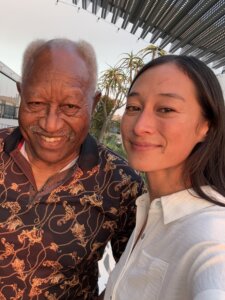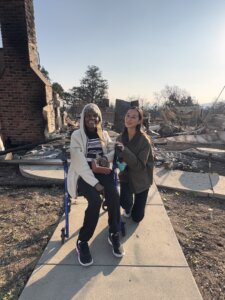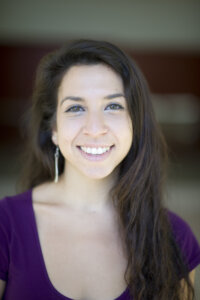Kalina Silverman is the founder of ‘Big Talk’ Courtesy of Kalina Silverman
Nicole Lalagüe was on a work trip scouting wines in Uruguay when her home burned down. As the Los Angeles wildfires continued to spread, she booked the next flight back. “All that I had was what was in my suitcase,” she told me over the phone a few months later, remembering the surreal experience of standing in the airport, holding onto her only remaining belongings. Lalagüe, owner and head sommelier at Pasadena Wine Shop, knew, intellectually, that her physical home was gone. But thousands of miles away, she hadn’t seen it herself — the fire, the smoke, or the stuff turned to rubble. It would be weeks before she’d be allowed to face the debris.
“In the beginning, it almost felt like a bad dream,” she said.
During the chaotic early days after her return, she agreed to let a friend connect her with a stranger. Kalina Silverman, the founder of “Big Talk,” showed up with her phone to film a video. Lalagüe watched a few of the videos Silverman had already posted to Instagram, interviewing people whose homes, like hers, were gone. “Maybe mine will be a little less emotional,” thought Lalagüe, who said she’s been taking care of herself since she moved out of her family’s home at 16 and is “not someone who breaks at the slightest nudge.”
But Silverman had a kind, calm, and nurturing presence, Lalagüe remembered, and she gently asked deep, open-ended questions that invited Lalagüe to be herself and share her story. “I’m essentially on a ‘first date’ with Kalina and she’s asking me altar questions,” Lalagüe joked. The resulting video — which helped raise $36,000 for Lalagüe’s GoFundMe — “felt like the most honest representation of me publicly that has ever existed.”
In this moment of crisis, Lalagüe no longer had tangible things. “It’s like the only feeling of home you have are the people that you’re with,” she said. She felt surrounded by friends and family, who offered spare bedrooms and emotional support. And then suddenly by strangers, too, who saw her video and commented, donated, and reached out.
“The biggest gift that I could receive were those people,” she said. “And those people would have never seen my story if it wasn’t for Kalina.”
Making ‘Big Talk’

The recent wildfires galvanized Silverman to jump into the news cycle for the first time, but she’s been making “Big Talk” for over a decade. That is, as she puts it, she’s been “skipping small talk to ask a deeper question and make more meaningful connections.” Her TEDx talk on the topic and interview videos have garnered millions of views. The work has evolved through different iterations since she started it as a college student, growing from an experiment into an unexpected career.
Born to a Jewish father and a Chinese mother and raised in Santa Monica, Silverman grew up an “activity monster,” she told me over Zoom, playing piano and cello, swimming, doing art and theater, going to Chinese and Hebrew school, and more. She had “the good fortune of being able to try a lot of things and be exposed to a lot of different worlds,” she said. It made her love “learning from people from other cultures and worlds, and also sharing that with others. That curiosity, to me, is a passion that you can cultivate.”
Looking back, Silverman can identify a handful of early experiences that together culminated in “Big Talk.” When she was about five years old, there was the trip she took to China, where she watched her boisterous, friendly grandfather stop to greet and chat with everyone they encountered in the neighborhood. In his red sweater, he looked to her like “the Chinese Mr. Rogers.”
There was her volunteer stint at an orphanage in Cambodia at 16 that “opened up my eyes to the world and just wanting to always have a career where I was able to explore my curiosity, meet new people, travel, but also always be of service to others,” she said — but not as a doctor like her parents, two grandparents, one great-grandparent, and now her sister. “I’m too squeamish,” she said.
In 2012, she went to study broadcast journalism at Northwestern University, her first time living away from home. On the surface, she was still an “activity monster,” trying extracurriculars and joining a sorority. But “I was so uncertain, anxious, lonely on the inside,” she remembered. “One night, I was having a meaningful conversation with a friend, and I said, ‘Wow, I wish more conversations could be like this,’” she said. “He was like, ‘Screw small talk.’ And that’s where I came up with the name ‘Big Talk,’” though she didn’t know what it would be yet.
The summer after her sophomore year, she joined a high school friend who was studying film at Columbia on a trip to Ecuador to work on a docu-series about education. “We wandered throughout this whole country, walking up to strangers and trying to gain trust right away,” she said. “I felt like that was something we don’t do back in our ordinary lives.” That same summer, The Memory Archives, a joint program of Northwestern and the University of Hamburg, took her to Germany to work on a Holocaust oral history project. “Again, it was like, how do you talk to someone about something that’s so sensitive and vulnerable? But once I did, I saw how magical and powerful it is to have vulnerable conversations.”
On Silverman’s last day in Germany, she said she saw a question written on a remnant of the Berlin Wall that brought all the pieces together: “What do you want to do before you die?”
Back home from South America and Europe, Silverman had six weeks to spare before returning to school. She grabbed her “journalism student setup” — video camera, tripod and microphone — and started walking up to strangers all over LA asking them, “What do you want to do before you die?” She asked a seven-year-old boy, a homeless man, a woman stepping out of the water at the beach, and anyone else who would talk to her.
In Beverly Hills one day, she approached a man dressed in a suit, holding a briefcase, and looking “way too busy to be bothered.” But he agreed to talk, and “he broke down crying and told me how he wished he spent more time with his family,” Silverman recalled. “I just remember feeling, this is it, this is why I’m doing this project. I’m onto something.”
The final video went viral, as did the TEDx talk she gave about it a year and a half later. After graduating, Silverman won a Fulbright grant to spend a year in Singapore “to research ways to use Big Talk to build empathy across cultures.” She’s given speeches and corporate workshops. She’s run pop-up events with music, art, and Big Talk, including a Big Talk Shabbat dinner. And she created a Big Talk card game and app featuring open-ended questions like: “What life lessons have you learned recently?” “What do you miss from childhood and how can you bring that back into your life?” “What is your ideal way to celebrate?” and “What are you proud of?”
Silverman started receiving dozens of messages from people all over the world. She’s heard from mothers, soldiers, leaders, and more in notes that came from Thailand, Sweden, Germany, Israel, South Africa, and closer to home — a coach for the Los Angeles Lakers’ reached out to tell her he was using Big Talk questions on the bus.
Last year, she landed a six-figure book deal, which gave her the confidence to pursue Big Talk without taking as many side jobs, like the receptionist job she had while applying for the Fulbright and other gigs as a babysitter, model, and surf instructor. “The book really gave me a lot of peace,” she said. Her guide to the art of skipping small talk “for anyone looking to engage authentically and create more fulfilling relationships” is due out in 2026.
She has also circled back to the beginnings of Big Talk. Once again, she’s walking up to strangers in LA to ask them “altar” questions, as Lalagüe put it, and posting their videos to Instagram. “I made a whole loop around the world and went right back to where I started,” Silverman said.
‘What I know how to do’
Stepping out of her 10 a.m. Taekwondo class one morning in January, Silverman saw a fire blazing in the hills. She drove to her mom’s place on the edge of Santa Monica and the Palisades and together they joined a crowd watching the fire grow and the smoke spread. Though they were already encountering Pacific Palisades residents who’d evacuated their homes, “I didn’t assume that the houses were burning. I don’t think anyone assumed that,” she said. Not yet, anyway.
“The sky is red. There’s ash everywhere. It’s pretty awful. Most of my friends are evacuating,” she recalled. She wasn’t in an evacuation zone, but the air quality was so bad, she spent a few days with her sister, who lives downtown and has air purifiers. Silverman didn’t want to leave the city entirely though. It took a couple days before it clicked. “I see all these journalists out there on the street in the fire zones, talking and sharing stories,” Silverman said. “I wanted to be there and helping out in that way, because that’s what I know how to do is interview people.”
On a whim, she emailed someone at GoFundMe: “I’m just like, ‘Hey, I have this crazy idea. What if I interviewed people who just lost their homes and we link it to their GoFundMes?’” She proceeded to text or email every single person on the list she got, offering to share video interviews with her sizable social media following to help bolster their fundraisers.

The first person she spoke to was Walt Butler. “What did you love and lose in the fire?” she asked. At 83, with a salt and pepper mustache and a tuft of white hair behind each ear, Butler choked back sobs. “I lost everything,” he told her. The Eaton fire had devoured his home of over 60 years. A former coach who also had a sporting goods store, he’d always been eager to lend a helping hand, giving away his own jackets when he saw a young man shivering on a bench or sending kids off with shoes even if they couldn’t pay.
“I’ve been knocked down before, but not like this,” Butler said. He wasn’t giving up, though, and he was moved by those reaching out to him. “A young man today drove at least two or three hundred people to see their houses,” he said. “I offered to give him some money for gas. He says, ‘No I won’t take it, Walt, because you wouldn’t take it.’”
Silverman went home and edited their long conversation down to 90 powerful seconds, posted the video to Instagram, and woke up the next day to see views, likes, and donations pouring in. “I was like holy shit,” she said. “That video of Walt ended up raising over $900,000 for him, and he became almost like a poster child of the fires.”
Suddenly, her inbox was flooded with people hoping to share their stories and draw attention to their fundraisers. “I was just one girl driving around in my dented Subaru,” Silverman said. “I kept interviewing people, then editing it that night, and posting it, and then the next morning it’d be, like, tens of thousands of dollars,” she said. She simultaneously felt the weight and responsibility of having to pick who she could interview, zigzagging across LA every day, and pride in “seeing the tangible impact Big Talk can make.”
She kept at it, asking questions like “What did you save in the fire?” and “What legacy do you want to leave behind?” She spoke to Chad, who carried his paralyzed mother down five flights of stairs with a neighbor to get her out in time. And 10-year-old Grayson, who is blind and lost his Legos and Braille “stuff.” And Nicole Lalagüe, the sommelier and wine shop owner who’d had an unstable childhood and finally found a place that felt like home, before the fires turned it into a pile of ashes.
Silverman said she often cried in the car driving in and out of burn zones, evacuation centers, and other sites of temporary refuge. “It’s so jarring. It’s so much worse than when you watch on TV. It literally looks like a war zone,” she said. “You can see it and you can smell it.”
Most of the time, she could get her tears out on the road and manage to keep it together during the interviews themselves. But not when she talked to 93-year-old Eric, whose wife died just a couple years before the fire took the home they’d shared, and who was mourning both losses. “I met her on a dance floor at age 17 in Germany,” he said. “We danced for the rest of our lives.”
Silverman was determined to share not only the immense loss and grief she was being let in on, but also the incredible resilience, love, and kindness she witnessed. “I always made sure to end each interview, both while I was conducting the interview and the way I edited them, with a message of hope,” she said. When she asked Eric about his legacy, he told her, “My life is not gone and that’s amazing. I have five great-grandchildren, so there’s a lot to look forward to as they grow up.”

Ninety-seven-year-old Dorothy spoke to Silverman as she laid eyes on her former home for the first time. “The house is gone, but I’m here,” she said, remembering all the tea parties and pool shenanigans and fun she and her family had had there. “I don’t see this disaster, I see the good times,” she said. “I’ve had a beautiful life.”
“It’s so wonderful to see Kalina naturally kind of graduate from hearing people to helping people,” said Orly Israel, a friend who founded the Better Listener project. He didn’t make a Big Talk video with Silverman this winter, but his home was destroyed in the fires. “The biggest gift that you can give to someone who feels like they’ve lost everything is the reminder that you’re there for them,” he said. And sometimes that does come in the form of financial support. “It’s not just saying, ‘Hey, you can talk to me if you need to,’ which is incredibly important by the way, but, ‘Here’s enough support for a night or 100 nights or a house.’”
Silverman never intended to get swept up in current events. “After the elections and everything, I was like, I just want to stay clear of the news. I want to stay clear of politics,” she said. Instead, she wanted to “keep doing my Big Talk thing, where it’s very evergreen.”
But her foray with the fires inspired her to rethink her approach. She’s since traveled to Asheville, North Carolina, to make similar videos in the wake of Hurricane Helene, and interviewed Kenan Chan, a national park employee who lost his job due to federal budget cuts. “Something I’ve been thinking about a lot now is how do I enter moments with the Big Talk lens of showing our common humanity and how we can help each other,” she said. “I just bring it down to the human level.”
‘What do you want to do before you die?’
When I texted Lalagüe to ask if she’d talk about her experience making a video with Silverman, her response popped up immediately. “Anything for Kalina,” she wrote. Not only did Silverman feel like a friend by the time they finished speaking that day in January, but she’d also inspired Lalagüe to pay it forward.
“When you have been looked after and cared for by people you’ve never met, and had those meaningful interactions in a time of crisis with someone you’ve never met, it makes you want to be that for someone else,” she said. Recently, for example, Lalagüe’s wine shop ran a week-long fundraiser for a local firefighter who was severely injured in an off-duty accident, raising over $4,000 to help with his recovery and rehab.
“I feel more connected to my community than I ever have,” Lalagüe said.
It had been over a decade since Silverman started asking strangers “What do you want to do before you die?” when I posed this classic Big Talk question back to her. “One is to have a family. And the other is, I have this vision. I’ve nicknamed it World Ranch.” She imagines a hilltop ranch or farm that looks out over the ocean and takes in animals rescued from all over the world. It “hosts cultural events that bring people together, and hires people in need, whether it’s veterans, people with disabilities, or people fleeing conflict zones,” she said. “It’s almost like if Big Talk were a place, what would it look like?”
In the meantime, she’s continuing to make videos. She’s recently interviewed semi-known figures — like librarian influencer Mychal Threets and Sarah Natochenny, the voice of Ash Ketchum on Pokémon — and strangers, including a Maasai warrior from Tanzania, a mother whose son was killed by a drunk driver, a young woman who lost her husband to cancer, and a man navigating middle-age.
She continues to ask Big Talk questions, like: “What’s something people might not know about you just by looking at you?” “What are you proud of?” “What’s a difficult situation you’ve been through in life, and how did you get through it?” “What does being middle aged mean to you?” “What’s a brave or difficult choice you are glad you made?” “What gives you hope?”
“Everyone has a story,” Silverman said. “And everyone’s story is worth being heard.”

